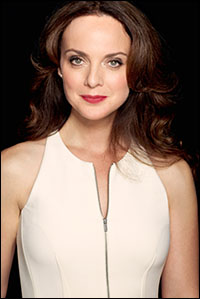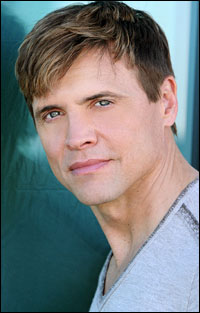
Errico made her Broadway debut as a bright 22-year-old from Long Island, as just about the only bright spot in the stultifying 1992 musical Anna Karenina. This quick flop was followed by a big Broadway chance–as Eliza Doolittle opposite Richard Chamberlin's 'enry 'iggins–in the most misguided production of My Fair Lady ever to come our way. Errico resurfaced the following season in the 1995 Encores! production of Call Me Madam, proving to be altogether delightful as the Princess Maria (opposite the equally charming Lewis Cleale). When Encores! went to cast the Mary Martin role in their 1996 production of One Touch of Venus, they eschewed casting an existing star in favor of the little-known Errico. Her performance was gossamer-like magic. Ben Brantley in the Times called her "divine" and "floating with the stars," and asked "where has Melissa Errico been all our lives?"
Mr. Brantley was hardly alone in his praise. The critical salvo put Errico on the brink of a glorious career as Broadway's next leading lady. Things didn't quite work out, though; her first big vehicle, playing the Katharine Hepburn role in the 1998 Cole Porter-derived High Society, had all the sizzle of a powder-dampened firecracker. Her next two musicals were poor (Amour, 2002) and poorer (Dracula, 2004). Which has left Errico–poised to conquer musical comedy on the heels of Venus–without any success on Broadway. She most recently appeared as Clara in the 2013 Classic Stage Company production of Passion, and that didn't work out too well either (with Errico forced to leave the show due to vocal indisposition).
But in Venus, in 1996, she was–yes–altogether magical. The Encores! production was not recorded, but the U.K.-based Jay Records arranged to make their own studio recording of the score. This turned out to be a long and tortured undertaking, apparently due to problems of financing. Three recording sessions were held in 2000, and then–nothing. Fans of Errico–those who saw Venus at City Center, and those who wished they had–waited impatiently as the years turned into a decade. Back they went into the studio in 2012, finally, and the recording has now been released. And yes, One Touch of Venus–after all this time–does not disappoint.
(The asterisked notes in the accompanying booklet suggest that Errico's five main songs were recorded in 2000, with conductor John Owen Edwards. A good half of the score seems to have been recorded over the last two years, with conductor James Holmes.)
| |
 |
|
| Melissa Errico |
Following which, the musical, like Lady in the Dark, more or less disappeared from view. Both shows were adapted for Hollywood in the mid-1940s, with the Weill scores decimated in the process; both underwent television adaptations in the mid-1950s. Both turned up within the first three seasons of Encores!, although Lady in the Dark (starring Christine Ebersole) was lukewarm. One Touch of Venus with Errico, though, was full-blown musical comedy joy–although it was obscured five weeks later by the power of the next Encores! offering, Kander & Ebb's Chicago.
And now we have the Encores! cast recording, which is the first complete recording of the score. Decca–which pioneered the original cast recording field earlier in 1943 with Oklahoma!–issued a mini-album with ten tracks featuring Martin, a studio cast, and what seems to be the Broadway pit orchestra. This gives us Martin's five numbers, a reprise, three non-Martin numbers plus abbreviated recordings of the two big de Mille ballets. An invaluable recording, yes; but given the restriction to five two-sided platters–and the absence of any original cast members other than Martin and Kenny Baker (as the barber Rodney Hatch)–the 1943 recording omits six major songs, including two of the most delightful ones.
Jay's new studio recording not only fills out the score, it gives us the opportunity to hear Weill's distinctive orchestrations (which are only moderately audible on the primitive recording). The best of Venus is very good indeed, headed by one of Weill's not-very-many standards, one that ranks among the finest Broadway love songs ever: the haunting "Speak Low" ("When You Speak Love"). Martin–and Errico–also triumphed with "That's Him," a simple, "quiet" number which altogether stops the busy show in its tracks. ("You know the way you feel about the 'Rhapsody in Blue?' That's him" goes Nash's lyric.) The other big ballads are "Foolish Heart," a waltz for Venus, and "West Wind," which is sung by the third member of the romantic triangle at the story's heart.
The song which typifies the show for me–along with "Speak Low," that is–is the star's opening number, "I'm a Stranger Here Myself." I cannot listen to it without being drawn into the Weill-world of the show, and I can't listen to it without wanting to hear the rest of the score. My other favorite is the title song, which was not included on the 1943 cast album--presumably because it was not sung by Martin but by the featured comedienne, Paula Laurence. (Laurence remained a minor Broadway celebrity for 60 years, thanks almost solely to her performance in Venus.) The song is pert, saucy, and smart. Laurence also got a second droll number called "Very Very Very": "One way to be very wealthy," she deadpans, "is to be very very very rich." We don't have Laurence on the new CD, but Victoria Clark sings these two songs and is pure gold.
| |
 |
|
| Brent Barrett |
Special mention must be made of "Doctor Crippen," the extended first act finale about a notorious, Edwardian wife-murderer. Weill and Nash clearly thought they had come up with another "Saga of Jenny"–the showstopper from Lady in the Dark–but the thing is endless and unlistenable, to my ears at least. Did audiences really sit through this for 567 performances? Oh, well. What are a few lapses when you've got "Speak Low" and the rest?
Jay has done a fine job on this recording, bringing us a golden score that we really haven't quite heard. Errico is joined by Brent Barrett as Rodney Hatch, the modern-day (circa 1943) barber who Venus falls in love with; Ron Raines as Whitelaw Savory, the modern art aficionado who falls in love with Venus; and the aforementioned Vicky Clark. Also on hand are Judy Kaye and Lauren Worsham. The two-disc set also includes three songs that were cut prior to the opening, "Vive La Difference," "Who Am I," and "Love in a Mist."
Before I sign off, let me add a note for those of you interested in orchestrations. Having found a clutch of Venus score pages that were not in Weill's hand while doing research for my 2009 book "The Sound of Broadway Music," I identified them as being written by Russell Bennett. The good people at the Kurt Weill Foundation duly investigated, and discovered that these pages actually came from a copyist, one John Costa Coll (whose musical handwriting is–indeed–quite similar to that of Bennett). These were passages Weill had orchestrated elsewhere in the score; rather than rewrite them, he asked Coll to copy the passages. There are other minor sections in the show by two as-yet-unidentified orchestrators, but my attribution to Bennett was mistaken. I thank the Weill Foundation archivists for solving the mystery, and gladly take the opportunity to correct it.
(Steven Suskin is author of "Show Tunes," “The Sound of Broadway Music: A Book of Orchestrators and Orchestrations,” “Second Act Trouble,” the “Opening Night on Broadway” books, and "The Book of Mormon: The Testament of a Broadway Musical." He also writes the Aisle View blog at The Huffington Post. He can be reached at ssuskin@aol.com.)










